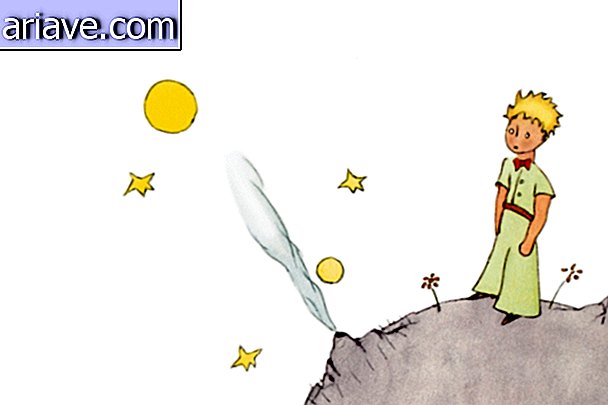Personal Testimonial: Alzheimer's Taught Me That Love Doesn't Go Out
When I was a child, I was terribly afraid of rain, and when it rained, only one thing calmed me. After finding out what was my greatest calming factor, it was enough that a few drops began to fall and I would soon pick up the phone and call my grandmother. She told me, with all the patience in the world, that rain was important for strawberries to grow.
To this day I use the diminutive version of my favorite fruit. Market owner, my grandmother showed me early on that nature is, besides being absurdly beautiful, magical enough to make a seed grow into something healthy and delicious. She had a huge yard where she planted everything she sold, and when I got there we would go and pick the two strawberries that would later be dessert.
Having that kind of memory is something that makes me extremely happy. Living with grandparents must be some sort of luck. And my luck, I didn't even know, would one day be even bigger.

When I was about 13 years old, I saw that the same grandmother who had filled me with love since I met, suddenly began to get aggressive and tell some absurd stories. One day she told us in horror about the 40 alligators she had seen in her backyard. In the other, he said that a procession had passed in front of his house at dawn, with everyone praying in Polish.
Early signs of Alzheimer's are often viewed as 'old stuff' thanks to the misconception that aging means 'falling'. My grandfather nervously tried to explain to his grandmother that she was wrong, which only caused more confusion.
With the health of Grandpa getting worse, my mother decided, despite their wishes, to take them to our house. And suddenly we reorganized an entire family structure so that two distinguished new residents would settle down. There began one of the most beautiful experiences of our lives.

By now Grandma barely recognized my mother. She knew who my grandfather was, only. And I was jealous when I saw myself pleasing my old man. It was too strange to see that, and at first we tried to explain to her that I was her granddaughter. Then we learned that who had to understand something was us, not her.
Grandma didn't stay that way because she wanted to. She didn't act aggressively because she didn't like her family - imagine! It turns out that suddenly she began to have delusions and lose her memory. There is no way for a person to react well to a situation like this, let's face it.
And then Grandpa died. He got up to go to the bathroom at night and had a cardiopulmonary arrest. He died before the ambulance arrived. At the funeral, Grandmother wept, stood beside the coffin, prayed, and understood what was happening. The next day, however, she asked where Theodoro was. I explained that he had died the day before and, of course, the grieving process began again.

It was then that we realized that it would be no use bringing this memory to her every day. From then on, when she asked about Theodoro, we would say that he was traveling for work. And that's how it was for almost ten years, since she asked about him every day.
The late afternoons were difficult. The day was ending and Grandma was beginning to want to go home. It was no use trying to make her understand that this was her new home. In fact, our concern was to lock the gates so she wouldn't run away - once she left without anyone seeing and walked to the corner of the house alone, with her ID card in hand, saying that she would take the bus.
At first I was sad when I thought about Grandma's situation more calmly. I put myself in her shoes and inevitably wondered just how horrible the life of the Alzheimer's carrier should be. Fortunately, my mother did not allow us to feel pity or fear. Instead, she advised us to step into Grandma's “joke” and face the situation with good humor and affection. It worked out more than right.

A few days after Grandpa's death, Grandma eventually found a doll, which was on my mother's bed. She quickly took the doll in her arms and asked who had left that child there alone. It was not hard to understand that at that moment she had established a new affective connection and that there was nothing wrong with that.
My mother encouraged her grandmother to take care of the doll, and from then on she even bought baby clothes and accessories for her grandmother to take care of. When we went to the market, for example, Grandma and the baby would go too. And everyone stopped to talk to her, who proudly recounted some recent achievement of the child.
Each day the baby had a name. It was Daiana about three times, I believe, and then I understood that our affective memory goes beyond the faces and names we recognize. At those times when the baby was called Daiana, I knew that somehow the same grandmother who made me lose my fear of rain was before me, now trying to take care of a different child.

And back home we understood that the best way to get through it was with a good mood. When she saw someone nervous or crying, her grandmother was nervous too, restless, so we made sure to let her feel only our positive energies whenever possible.
The house we lived in at the time had four rooms that were higher up - there was a gap that separated the rest of the house, and to get to the kitchen we had to go down a staircase of about five or so. My room was next to Grandma's room, but in her mind each room was a kind of house.
Every day, while at the desk doing some work for school, she would knock on my bedroom door, excuse herself, and ask if she could come in. I would answer, "But of course, neighbor!", And she would walk in ceremoniously and sit on my bed. Sometimes I thought my computer was a sewing machine and brought me sheets to sew. And then I would pass the sheet bar at the computer keyboard, as if sewing, and hand it to her, who always wondered how much the service had been.

She had a certain need to deal with money and numbers. Since he had been a marketer all his life, he used to do the math and handle money often. And then my mother bought bundles of toy money, which we gradually gave her. Sometimes I would spend hours counting the bills, and pay me well for the sheet bars I made for her.
In 2005 she had, without exaggeration, about 10 strokes (stroke or "stroke" as it is popularly known) and needed to be hospitalized a few times. After returning to the house, she was bedridden for a long time, unable to walk, and from then on her speech became more and more compromised.
After that she started wearing diapers and relied on a wheelchair. She got mad when we were changing her diapers - it's easy to understand: for her, it was two people who occasionally took off their clothes - who wouldn't be annoyed either? She slapped us and spoke Homeric curse words as we changed her diapers. The best way to handle it? Letting her fight. Then we would fill her with kisses and hugs, which were always reciprocated.

Another curious thing: in very rare situations she had a few moments of clarity and remembered my mother's name, for example. On my 21st birthday in 2008, my mother went to the bakery and I stayed with my grandmother in the kitchen. I bent down to her, who was sitting, and said, "Grandma, this is my birthday, you know that?" And she started singing, "Happy birthday to you." Thrilled, I smiled and cried at the same time. I gave her a tight hug and said in her ear that I loved her very much, to which she replied, "I love you too." Needless to say, it was the best gift I could receive.
When I moved to Curitiba, I missed my grandmother absurdly. She was really missing me, so hard to measure and explain, and when the weekend came and I came home, seeing my little one was the best thing in the world.
As the disease progressed, she became thinner and thinner. My mother knew Grandma always enjoyed eating lots of fruits and vegetables, and we started to make her baby food with supplements and the fruits she always loved. When I was a child and she would take me to the backyard to pick strawberry, I saw the affection she had for the things that came from the earth. She never picked a fruit or a vegetable without saying "look how beautiful". And we made sure to make sure she continued to eat healthy. Sometimes she only ate if she saw that the baby was being fed too, so we pretended to be feeding the child quite often.

When I returned home after college, my mother had moved into a small, two-bedroom apartment. And then I shared the room with my grandmother. At that time she was in bed and in an armchair that we placed by the bed. We would lift her on her lap to move her, and at night we would shift her every two hours.
I slept in the same bed as her and woke up every day with her covering me and petting my head, like I was her doll. He was often angry when we wiped his face on the bed for breakfast. Even with all her bravery, right after breakfast, when we hugged her and filled her with kisses, she returned the affection and began to spread smiles.
As it became more and more debilitated, we changed the doll for a smaller and lighter, because even unable to stand, she made a point of taking care of her "little daughter". It was also during this time that she started calling my mother, her daughter, "mommy" as well. If the mother cares, once again the grandmother was right.

In October 2011, one sunny and beautiful Sunday morning, Grandma decided to leave. It left behind a huge longing and a void that, we know, will never be filled. Since then, my mother has been visiting some ladies who, for one reason or another, feel alone at this stage of life. I go with her whenever I can, and I'm in love with these new grandparents that life has given me.
A lot of people scowled when they learned that we were changing my grandmother's diaper. In fact, peeing and adult poop isn't the funniest thing in the world, but even worse is someone feeling unable to do their own needs without help, so our sacrifice was minimal near her suffering. And I'd change 1 million more diapers if needed.
During the years she lived in bed, we took every possible care. She never had a bedsore, which are those common wounds in bedridden patients. My mother took an absurd care of my grandmother: she passed creams, made vitamins, changed her grandmother every hour, bathed, and of course also left her private life behind the scenes.

For my mother, it was almost nine years without being able to even go to the market without depending on someone to take care of Grandma. When she needed to travel, for example, it was me who stayed with her grandmother. It never surprised me, therefore, that my grandmother called her "Mom."
Alzheimer's disease changes family structure overnight and makes us revise life, even from a philosophical and spiritual point of view. My grandmother taught us a lot every day. And what I learned the most in this time together was to value my family and to understand that love, as the most powerful of forces, is etched in us even as the memory goes away.
Today I am 28 years old and the rain no longer scares me anymore. Strawberry Shortcake is my favorite fruit and my mother, the woman of my life, my greatest example. There is not a day I go without telling my mother how much I love her. And because I said and showed love to my grandmother too, when she rested what was left to me was a feeling that I learned what I needed to have learned from her. Is there anything more beautiful than learning something new? With my grandmother Helena, I learned that rain is necessary, that everything passes and that love is part of what we are, not what we remember.
Text originally published on 21/09/2015











